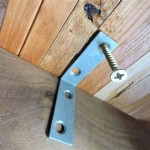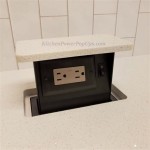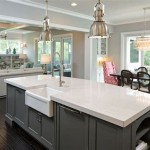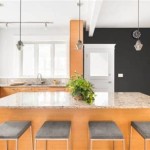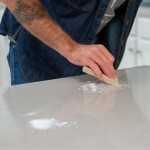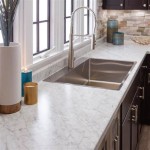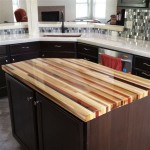Pros and Cons of Butcher Block Countertops
Butcher block countertops have experienced a resurgence in popularity, offering a warm, natural aesthetic to kitchens and other spaces. Characterized by their construction from hardwood strips glued together, these countertops provide a durable and versatile surface. However, like any material, butcher block presents both advantages and disadvantages that potential buyers must carefully consider before making a purchasing decision. This discussion explores the multifaceted nature of butcher block countertops, examining their strengths and weaknesses in detail.
Aesthetic Appeal and Versatility
One of the primary reasons for butcher block's appeal lies in its inherent aesthetic qualities. The natural variations in wood grain, color, and species create a visually appealing surface that complements a wide range of kitchen styles, from rustic and farmhouse to modern and contemporary. Butcher block can be crafted from various hardwoods, including maple, oak, walnut, cherry, and birch, each offering a unique appearance and hardness level. This versatility allows homeowners to select a butcher block that aligns with their design preferences and budget.
Furthermore, butcher block's warmth and texture contribute to a welcoming atmosphere in the kitchen. Unlike cold, sterile surfaces such as stainless steel or concrete, butcher block offers a tactile experience and a visual connection to nature. The ability to customize the edge profile, thickness, and overall dimensions of the countertop further enhances its design flexibility, allowing for a truly bespoke kitchen feature. A butcher block countertop can seamlessly integrate into different layouts, serving as an island, peninsula, or primary work surface.
Beyond aesthetics, butcher block's versatility extends to its functionality. It can serve as both a food preparation surface and an aesthetic feature, blending practicality with visual appeal. The warm tones of the wood can also serve as a visual anchor, tying together other design elements in the kitchen, such as cabinetry, flooring, and backsplash.
Durability and Longevity
When properly maintained, butcher block countertops can offer impressive durability and longevity. Hardwoods such as maple, oak, and walnut are particularly resistant to scratches and dents, ensuring that the countertop can withstand the rigors of daily use. The density of the wood fibers contributes to its ability to absorb impact and resist deformation, making it a suitable surface for chopping, slicing, and other food preparation tasks.
The inherent nature of wood allows for the repair of minor scratches and dents through sanding and refinishing. Unlike synthetic materials that may require replacement upon damage, butcher block can be restored to its original condition with relative ease. This repairability extends the lifespan of the countertop, making it a sustainable and cost-effective option in the long run.
However, it's crucial to understand that the durability of butcher block is directly linked to its maintenance. Regular oiling is necessary to prevent the wood from drying out, cracking, or warping. Proper sealing also protects the surface from moisture absorption, which can lead to staining and bacterial growth. Neglecting these maintenance requirements can significantly shorten the lifespan of the countertop and compromise its structural integrity.
The choice of wood species also impacts durability. Softer woods like pine are more susceptible to scratches and dents compared to hardwoods like maple or walnut. When selecting butcher block, it’s important to consider the intended use and the expected level of wear and tear to choose a species that offers the appropriate level of resistance.
Maintenance Requirements
While butcher block offers a warm and durable surface, it demands consistent and diligent maintenance to preserve its beauty and integrity. Unlike impervious surfaces, wood is porous and susceptible to moisture absorption and staining. Regular oiling and sealing are essential to prevent these issues and maintain the countertop's hygiene.
Oiling is typically recommended every few weeks or months, depending on the frequency of use and environmental conditions. Food-grade mineral oil or specialized butcher block oils are used to replenish the wood's natural oils, preventing it from drying out and cracking. The oil also creates a protective barrier against moisture penetration and staining.
Sealing, typically done with a food-safe varnish or polyurethane, provides a more durable protective layer against moisture and stains. However, sealed butcher block cannot be used directly for cutting or chopping, as the sealant can be damaged or chipped, potentially contaminating food. If the intention is to use the butcher block for food preparation without a cutting board, oiling is the preferred method.
Cleaning butcher block requires a gentle approach. Harsh chemicals and abrasive cleaners should be avoided, as they can damage the wood and strip away the protective oil or sealant. A mild soap and water solution, followed by thorough drying, is usually sufficient for removing food residue and stains. Promptly wiping up spills is crucial to prevent them from penetrating the wood and causing permanent discoloration.
The maintenance requirements of butcher block can be a deterrent for some homeowners, especially those seeking a low-maintenance countertop option. However, for those willing to invest the time and effort in proper care, butcher block can provide a long-lasting and beautiful surface.
Susceptibility to Moisture and Staining
The porous nature of wood makes butcher block inherently susceptible to moisture and staining. Without proper sealing and maintenance, spills and liquids can penetrate the wood fibers, leading to discoloration, warping, and bacterial growth. This is a significant concern in a kitchen environment, where exposure to water, food, and other liquids is common.
Water damage can cause the wood to swell, leading to cracks and distortions. Repeated exposure to moisture can also create a breeding ground for mold and mildew, posing a health risk. Stains from coffee, wine, juice, and other pigmented liquids can be difficult to remove, especially if they are allowed to sit on the surface for an extended period.
To mitigate these risks, regular oiling or sealing is crucial. The protective layer created by these treatments helps to repel moisture and prevent stains from penetrating the wood. Promptly wiping up spills and avoiding prolonged exposure to water are also essential preventative measures.
The installation of butcher block around sinks and other areas prone to moisture requires extra care. Sealing the edges and seams with a waterproof sealant can help prevent water from seeping into the wood from underneath. Proper ventilation is also important to allow the countertop to dry thoroughly after exposure to moisture.
Cost Considerations
The cost of butcher block countertops can vary significantly depending on the type of wood, the thickness of the block, the edge profile, and the overall size of the countertop. Hardwoods like walnut and cherry tend to be more expensive than softer woods like maple or birch. Thicker butcher blocks and custom edge profiles also add to the overall cost.
Compared to laminate countertops, butcher block is generally more expensive. However, it can be a more affordable option than high-end materials like granite or quartz. The cost of installation should also be factored into the overall budget. Professional installation is recommended to ensure that the countertop is properly sealed and secured, preventing moisture damage and ensuring its longevity.
While the initial cost of butcher block may be higher than some alternatives, its durability and repairability can make it a cost-effective option in the long run. The ability to sand and refinish the surface can extend its lifespan and prevent the need for replacement. Additionally, the natural beauty of butcher block can add value to a home, making it a worthwhile investment for some homeowners.
Consideration must also be given to the cost of ongoing maintenance. The recurring expense of purchasing food-grade mineral oil or sealant should be factored into the overall budget. While these costs are relatively minor, they are an essential part of maintaining the integrity and appearance of the butcher block countertop.
Hygiene and Food Safety
Concerns about hygiene and food safety are often raised in relation to butcher block countertops, given the porous nature of wood. However, research suggests that wood surfaces can be as hygienic as, or even more hygienic than, synthetic surfaces, provided they are properly maintained.
Wood possesses natural antimicrobial properties that can inhibit the growth of bacteria. The capillary action of wood fibers draws bacteria down into the wood, where they are deprived of moisture and nutrients and eventually die. However, this antimicrobial effect is dependent on the wood being properly oiled and sealed.
Regular cleaning with a mild soap and water solution is essential for removing food residue and preventing bacterial growth. Harsh chemicals and abrasive cleaners should be avoided, as they can damage the wood and strip away the protective oil or sealant. Surfaces should be allowed to dry thoroughly after cleaning to prevent moisture from accumulating.
Using separate cutting boards for raw meat and other foods is recommended to prevent cross-contamination. Cutting directly on the butcher block surface is generally safe, but it's important to clean and disinfect the surface thoroughly after each use. Oiling the surface regularly helps to seal the wood and prevent bacteria from penetrating deep into the fibers.
In conclusion, Butcher block countertops offer a blend of aesthetic appeal, durability, and functionality. However, the decision to opt for butcher block requires careful consideration of its maintenance requirements, cost, and susceptibility to moisture. Understanding the pros and cons allows for a well-informed choice that aligns with individual needs and preferences.

Butcher Block Countertops Pros And Cons To Consider Before Installation

Butcher Block Countertops Pros And Cons Dumpsters Com

Butcher Block Countertops Pros And Cons

Butcher Block Countertops Pros And Cons

Don T Butcher Block Counters Here S Why Lesher

Butcher Block Countertops Pros And Cons To Consider Before Installation

The Truth About Wood Countertops 23 Pros Cons Prudent Reviews

My Butcher Block Countertops Two Years Later Wildfire Interiors

Butcher Block Countertops Vs Quartz Watch Before Installing Island Maintenance Sealing Cost Youtube

Wood Kitchen Counters Pros Cons Faq My Experience The Inspired Room

